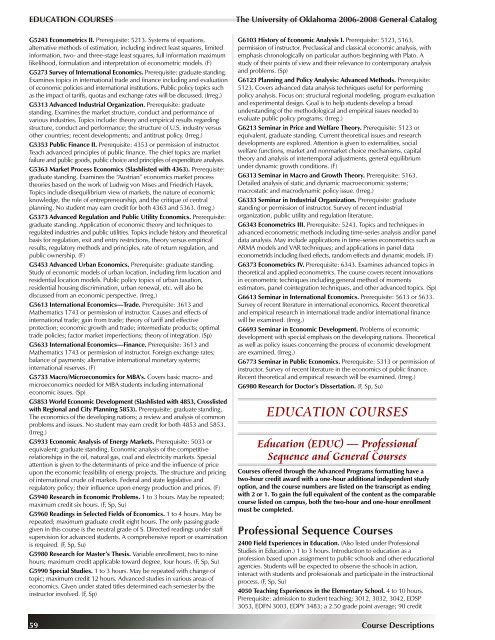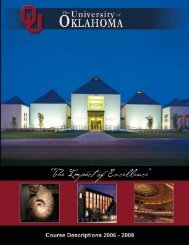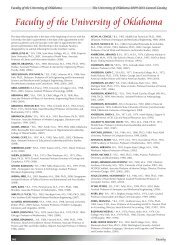ART - Catalog - University of Oklahoma
ART - Catalog - University of Oklahoma
ART - Catalog - University of Oklahoma
Create successful ePaper yourself
Turn your PDF publications into a flip-book with our unique Google optimized e-Paper software.
EDUCATION COURSES<br />
The Uni ver sity <strong>of</strong> <strong>Oklahoma</strong> 2006-2008 Gen eral Cat a log<br />
G5243 Econometrics II. Prerequisite: 5213. Systems <strong>of</strong> equations,<br />
alternative methods <strong>of</strong> estimation, including indirect least squares, limited<br />
information, two- and three-stage least squares, full information maximum<br />
likelihood, formulation and interpretation <strong>of</strong> econometric models. (F)<br />
G5273 Survey <strong>of</strong> International Economics. Prerequisite: graduate standing.<br />
Examines topics in international trade and finance including and evaluation<br />
<strong>of</strong> economic policies and international institutions. Public policy topics such<br />
as the impact <strong>of</strong> tariffs, quotas and exchange rates will be discussed. (Irreg.)<br />
G5313 Advanced Industrial Organization. Prerequisite: graduate<br />
standing. Examines the market structure, conduct and performance <strong>of</strong><br />
various industries. Topics include: theory and empirical results regarding<br />
structure, conduct and performance; the structure <strong>of</strong> U.S. industry versus<br />
other countries; recent developments; and antitrust policy. (Irreg.)<br />
G5353 Public Finance II. Prerequisite: 4353 or permission <strong>of</strong> instructor.<br />
Teach advanced principles <strong>of</strong> public finance. The chief topics are market<br />
failure and public goods, public choice and principles <strong>of</strong> expenditure analysis.<br />
G5363 Market Process Economics (Slashlisted with 4363). Prerequisite:<br />
graduate standing. Examines the “Austrian” economics market process<br />
theories based on the work <strong>of</strong> Ludwig von Mises and Friedrich Hayek.<br />
Topics include disequilibrium view <strong>of</strong> markets, the nature <strong>of</strong> economic<br />
knowledge, the role <strong>of</strong> entrepreneurship, and the critique <strong>of</strong> central<br />
planning. No student may earn credit for both 4363 and 5363. (Irreg.)<br />
G5373 Advanced Regulation and Public Utility Economics. Prerequisite:<br />
graduate standing. Application <strong>of</strong> economic theory and techniques to<br />
regulated industries and public utilities. Topics include history and theoretical<br />
basis for regulation, exit and entry restrictions, theory versus empirical<br />
results, regulatory methods and principles, rate <strong>of</strong> return regulation, and<br />
public ownership. (F)<br />
G5453 Advanced Urban Economics. Prerequisite: graduate standing.<br />
Study <strong>of</strong> economic models <strong>of</strong> urban location, including firm location and<br />
residential location models. Public policy topics <strong>of</strong> urban taxation,<br />
residential housing discrimination, urban renewal, etc. will also be<br />
discussed from an economic perspective. (Irreg.)<br />
G5613 International Economics—Trade. Prerequisite: 3613 and<br />
Mathematics 1743 or permission <strong>of</strong> instructor. Causes and effects <strong>of</strong><br />
international trade; gain from trade; theory <strong>of</strong> tariff and effective<br />
protection; economic growth and trade; intermediate products; optimal<br />
trade policies; factor market imperfections; theory <strong>of</strong> integration. (Sp)<br />
G5633 International Economics—Finance. Prerequisite: 3613 and<br />
Mathematics 1743 or permission <strong>of</strong> instructor. Foreign exchange rates;<br />
balance <strong>of</strong> payments; alternative international monetary systems;<br />
international reserves. (F)<br />
G5733 Macro/Microeconomics for MBA’s. Covers basic macro- and<br />
microeconomics needed for MBA students including international<br />
economic issues. (Sp)<br />
G5853 World Economic Development (Slashlisted with 4853, Crosslisted<br />
with Regional and City Planning 5853). Prerequisite: graduate standing.<br />
The economics <strong>of</strong> the developing nations; a review and analysis <strong>of</strong> common<br />
problems and issues. No student may earn credit for both 4853 and 5853.<br />
(Irreg.)<br />
G5933 Economic Analysis <strong>of</strong> Energy Markets. Prerequisite: 5033 or<br />
equivalent; graduate standing. Economic analysis <strong>of</strong> the competitive<br />
relationships in the oil, natural gas, coal and electricity markets. Special<br />
attention is given to the determinants <strong>of</strong> price and the influence <strong>of</strong> price<br />
upon the economic feasibility <strong>of</strong> energy projects. The structure and pricing<br />
<strong>of</strong> international crude oil markets. Federal and state legislative and<br />
regulatory policy; their influence upon energy production and prices. (F)<br />
G5940 Research in Economic Problems. 1 to 3 hours. May be repeated;<br />
maximum credit six hours. (F, Sp, Su)<br />
G5960 Readings in Selected Fields <strong>of</strong> Economics. 1 to 4 hours. May be<br />
repeated; maximum graduate credit eight hours. The only passing grade<br />
given in this course is the neutral grade <strong>of</strong> S. Directed readings under staff<br />
supervision for advanced students. A comprehensive report or examination<br />
is required. (F, Sp, Su)<br />
G5980 Research for Master’s Thesis. Variable enrollment, two to nine<br />
hours; maximum credit applicable toward degree, four hours. (F, Sp, Su)<br />
G5990 Special Studies. 1 to 3 hours. May be repeated with change <strong>of</strong><br />
topic; maximum credit 12 hours. Advanced studies in various areas <strong>of</strong><br />
economics. Given under stated titles determined each semester by the<br />
instructor involved. (F, Sp)<br />
G6103 History <strong>of</strong> Economic Analysis I. Prerequisite: 5123, 5163,<br />
permission <strong>of</strong> instructor. Preclassical and classical economic analysis, with<br />
emphasis chronologically on particular authors beginning with Plato. A<br />
study <strong>of</strong> their points <strong>of</strong> view and their relevance to contemporary analysis<br />
and problems. (Sp)<br />
G6123 Planning and Policy Analysis: Advanced Methods. Prerequisite:<br />
5123. Covers advanced data analysis techniques useful for performing<br />
policy analysis. Focus on: structural regional modeling, program evaluation<br />
and experimental design. Goal is to help students develop a broad<br />
understanding <strong>of</strong> the methodological and empirical issues needed to<br />
evaluate public policy programs. (Irreg.)<br />
G6213 Seminar in Price and Welfare Theory. Prerequisite: 5123 or<br />
equivalent, graduate standing. Current theoretical issues and research<br />
developments are explored. Attention is given to externalities, social<br />
welfare functions, market and nonmarket choice mechanisms, capital<br />
theory and analysis <strong>of</strong> intertemporal adjustments, general equilibrium<br />
under dynamic growth conditions. (F)<br />
G6313 Seminar in Macro and Growth Theory. Prerequisite: 5163.<br />
Detailed analysis <strong>of</strong> static and dynamic macroeconomic systems;<br />
macrostatic and macrodynamic policy issue. (Irreg.)<br />
G6333 Seminar in Industrial Organization. Prerequisite: graduate<br />
standing or permission <strong>of</strong> instructor. Survey <strong>of</strong> recent industrial<br />
organization, public utility and regulation literature.<br />
G6343 Econometrics III. Prerequisite: 5243. Topics and techniques in<br />
advanced econometric methods including time-series analysis and/or panel<br />
data analysis. May include applications in time-series econometrics such as<br />
ARMA models and VAR techniques; and applications in panel data<br />
econometrids including fixed effects, random effects and dynamic models. (F)<br />
G6373 Econometrics IV. Prerequisite: 6343. Examines advanced topics in<br />
theoretical and applied econometrics. The course covers recent innovations<br />
in econometric techniques including general method <strong>of</strong> moments<br />
estimators, panel cointegration techniques, and other advanced topics. (Sp)<br />
G6613 Seminar in International Economics. Prerequisite: 5613 or 5633.<br />
Survey <strong>of</strong> recent literature in international economics. Recent theoretical<br />
and empirical research in international trade and/or international finance<br />
will be examined. (Irreg.)<br />
G6693 Seminar in Economic Development. Problems <strong>of</strong> economic<br />
development with special emphasis on the developing nations. Theoretical<br />
as well as policy issues concerning the process <strong>of</strong> economic development<br />
are examined. (Irreg.)<br />
G6773 Seminar in Public Economics. Prerequisite: 5313 or permission <strong>of</strong><br />
instructor. Survey <strong>of</strong> recent literature in the economics <strong>of</strong> public finance.<br />
Recent theoretical and empirical research will be examined. (Irreg.)<br />
G6980 Research for Doctor’s Dissertation. (F, Sp, Su)<br />
EDUCATION COURSES<br />
Education (EDUC) — Pr<strong>of</strong>essional<br />
Sequence and General Courses<br />
Courses <strong>of</strong>fered through the Advanced Programs formatting have a<br />
two-hour credit award with a one-hour additional independent study<br />
option, and the course numbers are listed on the transcript as ending<br />
with 2 or 1. To gain the full equivalent <strong>of</strong> the content as the comparable<br />
course listed on campus, both the two-hour and one-hour enrollment<br />
must be completed.<br />
Pr<strong>of</strong>essional Sequence Courses<br />
2400 Field Experiences in Education. (Also listed under Pr<strong>of</strong>essional<br />
Studies in Education.) 1 to 3 hours. Introduction to education as a<br />
pr<strong>of</strong>ession based upon assignment to public schools and other educational<br />
agencies. Students will be expected to observe the schools in action,<br />
interact with students and pr<strong>of</strong>essionals and participate in the instructional<br />
process. (F, Sp, Su)<br />
4050 Teaching Experiences in the Elementary School. 4 to 10 hours.<br />
Prerequisite: admission to student teaching; 3012, 3032, 3042, EDSP<br />
3053, EDFN 3003, EDPY 3483; a 2.50 grade point average; 90 credit<br />
59 Course Descriptions








